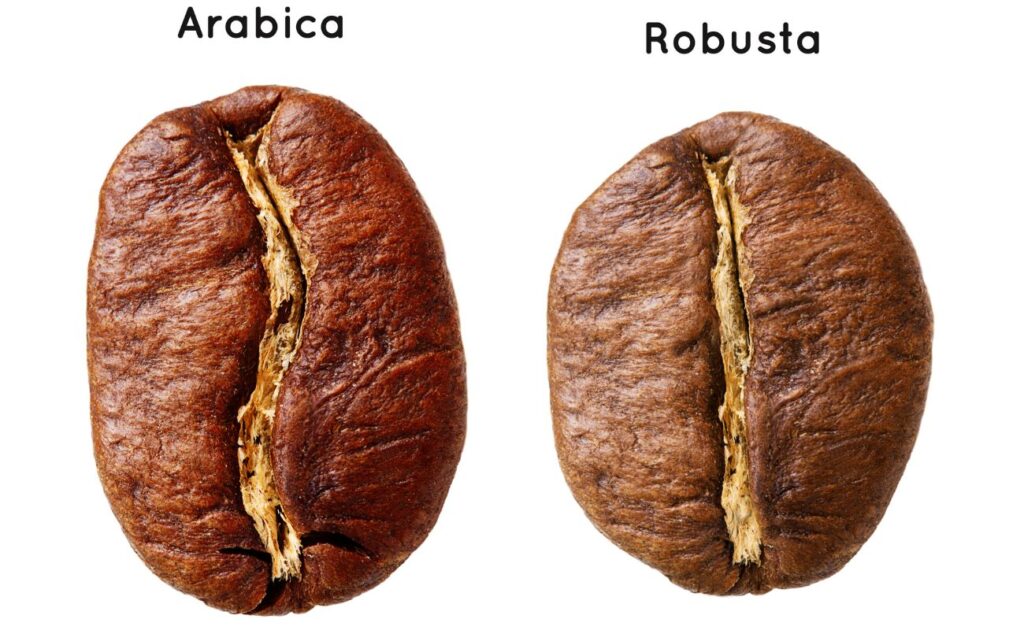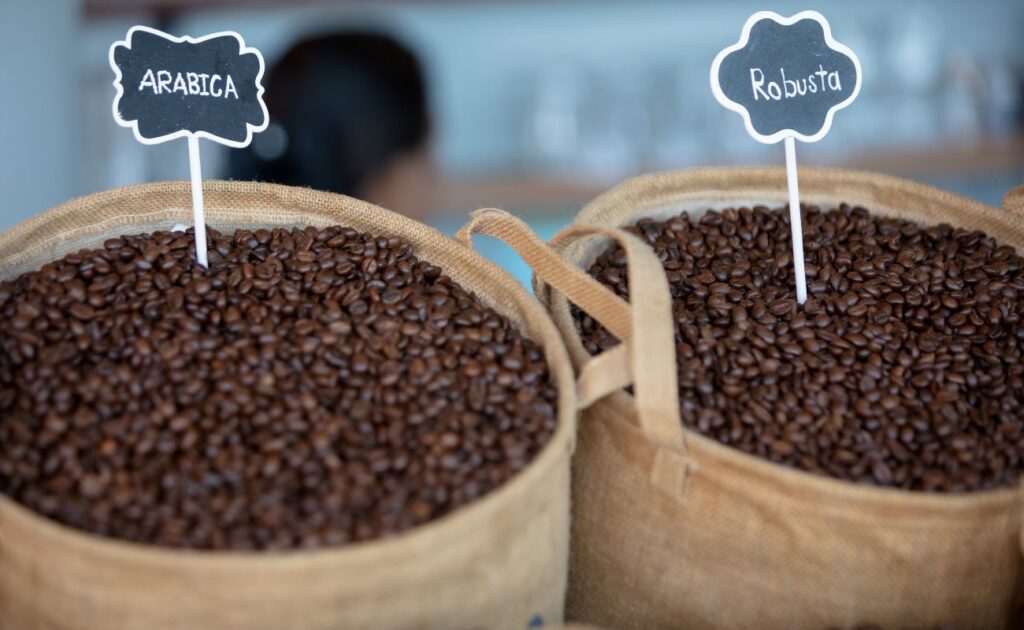Coffee is not just a beverage; it's an experience that begins with the bean. Each type of coffee bean has its own story, influenced by the soil, the climate, and the care with which it is grown and processed.
In this article, we'll delve into the different types of coffee beans, highlighting their unique characteristics and what makes them special. From the robust flavor of Robusta to the delicate taste of Arabica, get ready to discover the world behind your daily cup of coffee.
Robusta Coffee
Robusta coffee, scientifically known as Coffea canephora, is known for its intense flavor profile and high caffeine content. Originating in West Africa , this type of bean is primarily cultivated in regions ranging from Southeast Asia to Latin America, adapting well to warm climates and lower altitudes compared to its counterpart, Arabica.
One of Robusta's defining characteristics is its robustness, not only in flavor but also in its resistance to diseases and pests, making it more accessible and economical to produce. Robusta beans are rounder and darker in color , and their flavor profile is often described as earthy, with woody notes and a touch of bitterness that makes them perfect for espressos and blends, where a dense, rich crema is desired.
Robusta has approximately twice the caffeine content of Arabica, contributing to its stronger flavor and more potent stimulant effect . This characteristic makes it popular not only among those seeking an energy boost but also among growers, as caffeine acts as a natural pesticide against certain pests.
Although Robusta has often been considered of lower quality compared to Arabica, recent efforts in cultivation and processing have significantly improved its flavor profile, gaining appreciation among coffee aficionados for its unique character and contribution to the complexity of coffee blends.
With a focus on quality, Robusta can offer a rich and satisfying flavor experience, challenging traditional perceptions and opening up new possibilities in the world of coffee.

Arabica Coffee
Arabica coffee, scientifically known as Coffea arabica, is the most prized and widely consumed type of coffee bean in the world, representing approximately 60-70% of global coffee production. Originating in the highlands of Ethiopia , this bean has spread throughout the world's coffee-growing region, finding its place in the mountains of Latin America, Africa, and Asia, where it is primarily cultivated at altitudes ranging from 600 to 2,200 meters above sea level.
Arabica beans are prized for their smooth and complex flavor profile, with a wide range of aromatic notes that can include hints of fruit, flowers, and even nuances of chocolate or caramel, depending on their region of origin and processing method. This type of coffee tends to have higher acidity and lower caffeine content compared to Robusta, which contributes to its more delicate and less bitter taste.
Arabica cultivation requires specific climatic conditions and careful management, making it more susceptible to diseases and pests. However, these challenges are overcome thanks to sustainable farming practices and the commitment of coffee producers, who strive to maintain the high quality that coffee lovers expect from Arabica beans.
The popularity of Arabica coffee among consumers and baristas stems from its versatility and excellence across a wide range of brewing methods, from espresso to filter coffee. Its ability to deliver a rich and nuanced sensory experience makes it the preferred choice for specialty coffee shops and enthusiasts seeking to explore the diverse facets of coffee.
Some of the varieties of Arabica coffee beans are:
Brazil Mogiana
Single-origin coffee grown in the renowned Mogiana region. This coffee is distinguished by its balanced body and sweet notes, with hints of chocolate and nuts. Its sun-drying process enhances its natural sweetness, making it a favorite for those seeking a smooth yet flavorful coffee.
Honduras Comsa Cooperative
Specialty coffee with notes of lychee and nut. This Honey process coffee is not only delicious, but it also tells the story of its producing community, standing out for its natural sweetness and complex flavor.
Cajamarca, Peru
Single-origin coffee from the highlands of Cajamarca. This coffee impresses with its vibrant acidity and clear fruity notes. Its organic cultivation underscores a commitment to sustainability and the preservation of pure flavors, offering an exceptionally clean and refreshing cup.
100% Organic Arabica
This artisanal coffee stands out for its commitment to quality and the environment. Grown without chemicals, it offers a clean flavor profile with floral notes and a touch of citrus acidity. It's the perfect choice for coffee lovers who are mindful of their environmental impact.
Colombia Risaralda
This single-origin coffee, from the central mountain range of Colombia, is prized for its medium acidity and full body. Notes of caramel and ripe fruit make it exceptionally aromatic and balanced, ideal for any time of day.

Main differences between types of coffee beans
To summarize everything discussed and highlight the main differences between types of coffee beans, we have prepared the following comparative table:
| Feature | Arabica Coffee | Robusta Coffee |
|---|---|---|
| Origin | Ethiopia | West Africa |
| Cultivation Altitude | 600 - 2,200 meters above sea level | Less than 600 meters above sea level |
| Flavor Profile | Smooth, with aromatic notes | Strong, earthy |
| Acidity | Higher | Lower |
| Caffeine Content | Minor (approximately 1.2 - 1.5%) | Greater (approximately 2.2 - 2.7%) |
| Grain Shape | Oval with a sinuous S-shaped line | Round with a straighter line |
| Disease Resistance | Less durable, requires more care | More resistant to diseases and pests |
| Price | Generally higher due to its quality and complexity in cultivation | More economical due to its greater resistance and ease of cultivation |
This article has explored the distinctive characteristics of Arabica and Robusta coffee beans, highlighting their differences in flavor, aroma, and cultivation. We've seen how each bean type brings something unique to the cup of coffee, from the intensity of Robusta to the aromatic complexity of Arabica.
The choice between one or the other will depend on your personal preferences and the type of coffee experience you're looking for. Whatever you choose, the important thing is to enjoy every sip, appreciating the diversity and richness that the world of coffee has to offer.
At Café Barsel, we are committed to 100% Arabica coffees. We invite you to explore our wide variety of whole bean coffees, including specialty, organic, and single-origin varieties.






